Organisational Behaviour Report: Analysing Ryanair's Performance
VerifiedAdded on 2020/10/04
|13
|4167
|314
Report
AI Summary
This report provides an in-depth analysis of organisational behaviour within Ryanair, exploring how politics, power, and culture impact employee performance and productivity. It examines Handy's culture typology, detailing power, role, task, and person cultures, and how these influence employee behaviour. The report further investigates organisational power, including French and Raven's power types, such as legitimate, reward, coercive, expert, and referent power, and their implications for the airline. It also considers organisational politics, particularly Chanlat's characteristics of political behaviour. The report then delves into motivation theories, including Maslow's hierarchy of needs and Vroom's expectancy theory, and how these can be applied to improve employee motivation and performance. It concludes with a discussion on effective and ineffective teams and their roles in the workplace, and how organisational behaviour concepts assist management in complex situations. The analysis offers insights into how Ryanair can improve its organisational structure and enhance employee engagement.
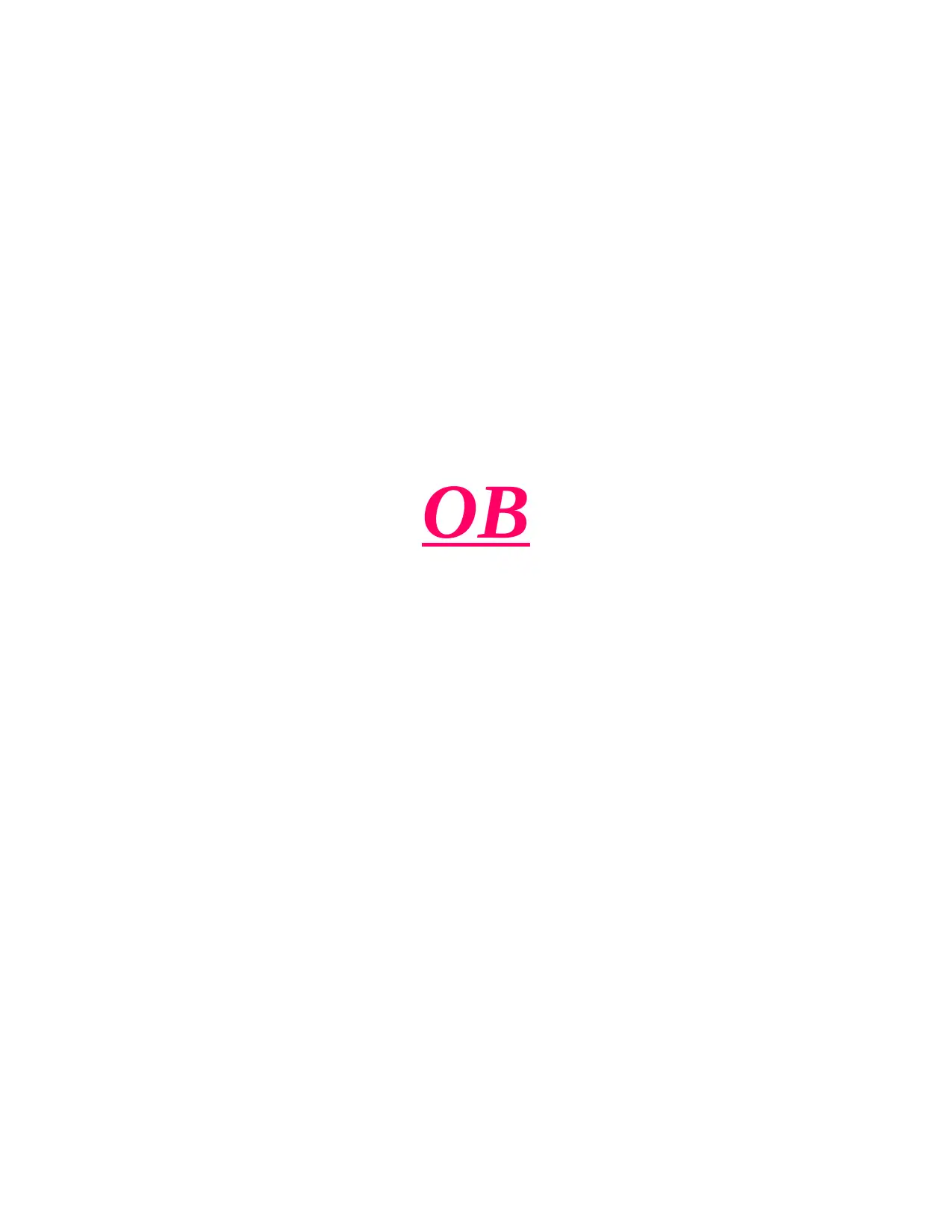
OB
Paraphrase This Document
Need a fresh take? Get an instant paraphrase of this document with our AI Paraphraser
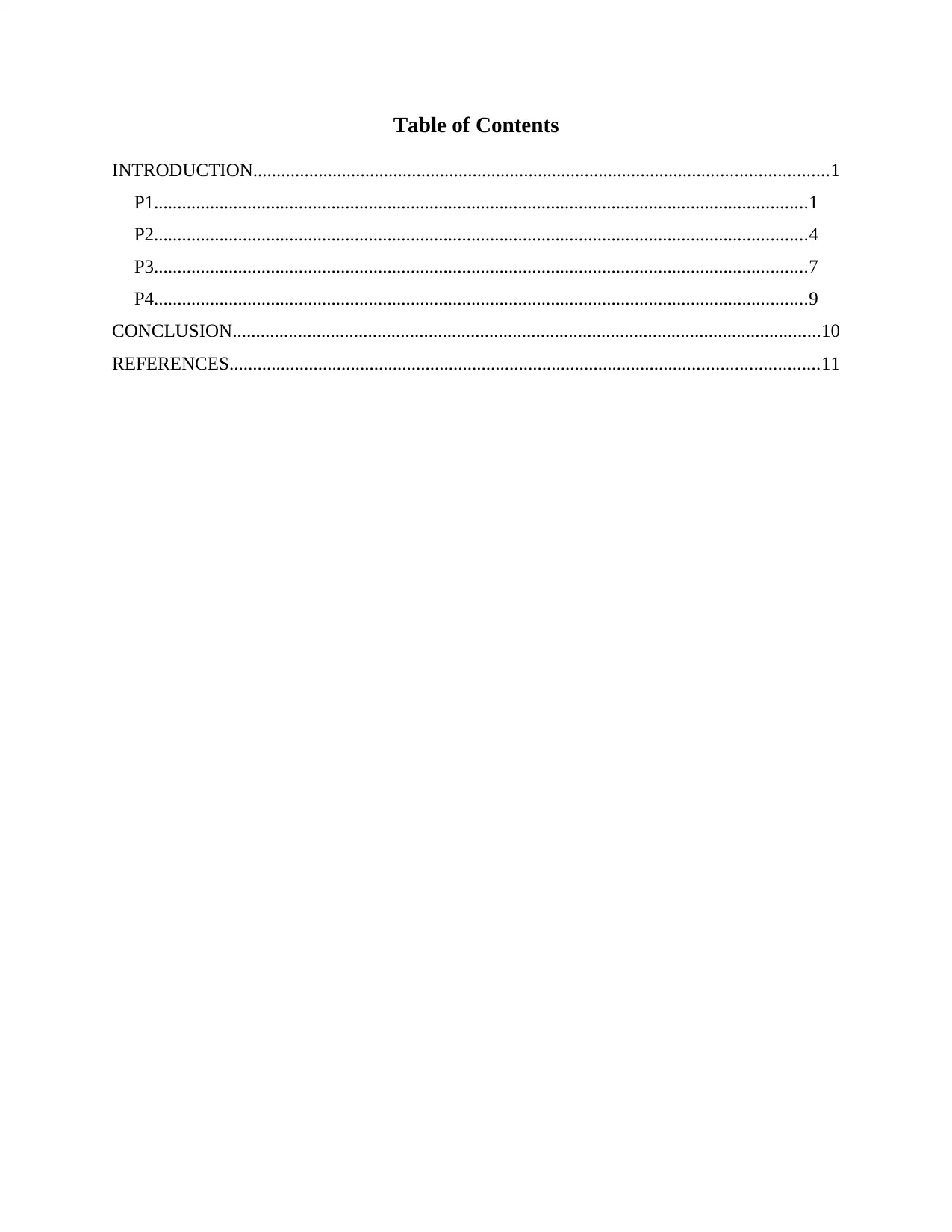
Table of Contents
INTRODUCTION...........................................................................................................................1
P1............................................................................................................................................1
P2............................................................................................................................................4
P3............................................................................................................................................7
P4............................................................................................................................................9
CONCLUSION..............................................................................................................................10
REFERENCES..............................................................................................................................11
INTRODUCTION...........................................................................................................................1
P1............................................................................................................................................1
P2............................................................................................................................................4
P3............................................................................................................................................7
P4............................................................................................................................................9
CONCLUSION..............................................................................................................................10
REFERENCES..............................................................................................................................11
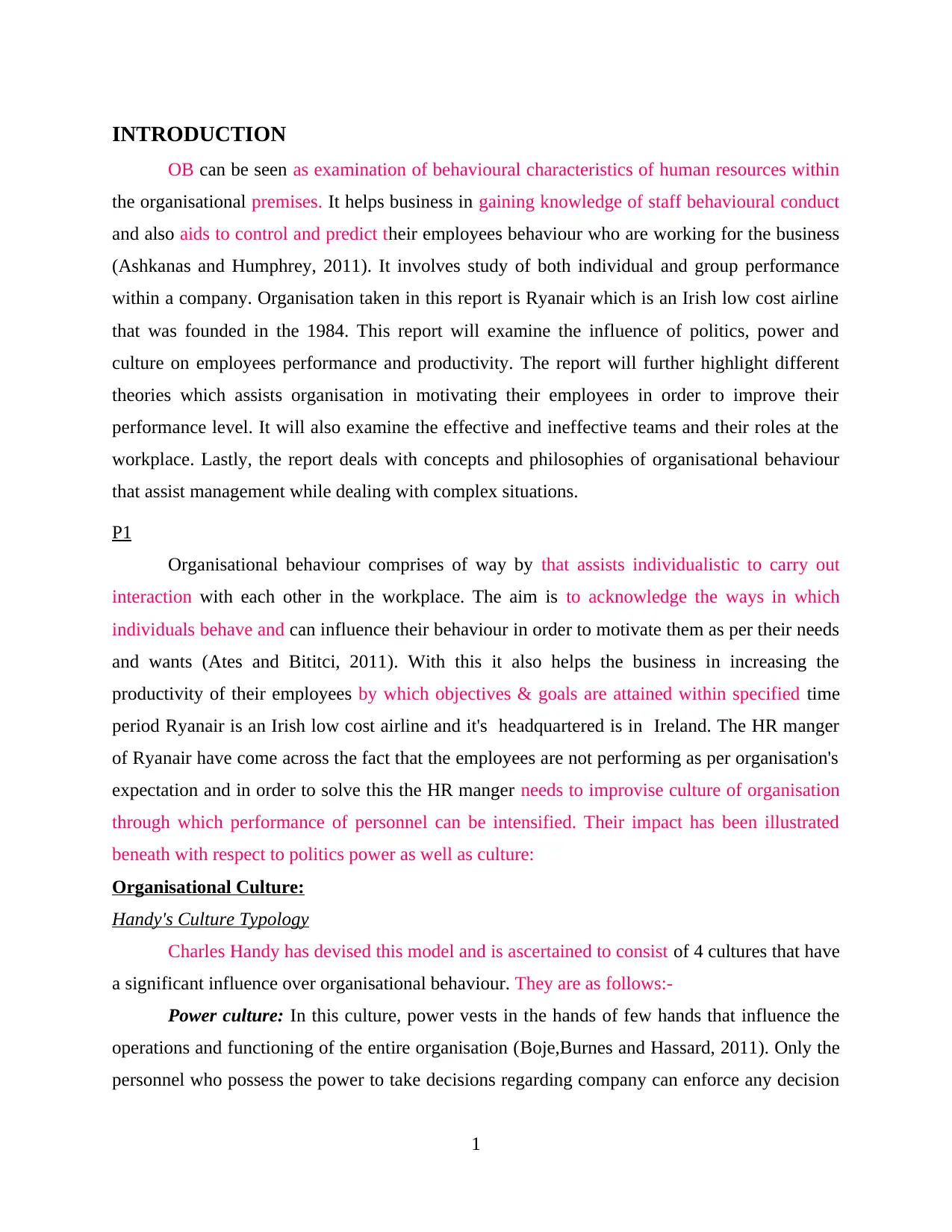
INTRODUCTION
OB can be seen as examination of behavioural characteristics of human resources within
the organisational premises. It helps business in gaining knowledge of staff behavioural conduct
and also aids to control and predict their employees behaviour who are working for the business
(Ashkanas and Humphrey, 2011). It involves study of both individual and group performance
within a company. Organisation taken in this report is Ryanair which is an Irish low cost airline
that was founded in the 1984. This report will examine the influence of politics, power and
culture on employees performance and productivity. The report will further highlight different
theories which assists organisation in motivating their employees in order to improve their
performance level. It will also examine the effective and ineffective teams and their roles at the
workplace. Lastly, the report deals with concepts and philosophies of organisational behaviour
that assist management while dealing with complex situations.
P1
Organisational behaviour comprises of way by that assists individualistic to carry out
interaction with each other in the workplace. The aim is to acknowledge the ways in which
individuals behave and can influence their behaviour in order to motivate them as per their needs
and wants (Ates and Bititci, 2011). With this it also helps the business in increasing the
productivity of their employees by which objectives & goals are attained within specified time
period Ryanair is an Irish low cost airline and it's headquartered is in Ireland. The HR manger
of Ryanair have come across the fact that the employees are not performing as per organisation's
expectation and in order to solve this the HR manger needs to improvise culture of organisation
through which performance of personnel can be intensified. Their impact has been illustrated
beneath with respect to politics power as well as culture:
Organisational Culture:
Handy's Culture Typology
Charles Handy has devised this model and is ascertained to consist of 4 cultures that have
a significant influence over organisational behaviour. They are as follows:-
Power culture: In this culture, power vests in the hands of few hands that influence the
operations and functioning of the entire organisation (Boje,Burnes and Hassard, 2011). Only the
personnel who possess the power to take decisions regarding company can enforce any decision
1
OB can be seen as examination of behavioural characteristics of human resources within
the organisational premises. It helps business in gaining knowledge of staff behavioural conduct
and also aids to control and predict their employees behaviour who are working for the business
(Ashkanas and Humphrey, 2011). It involves study of both individual and group performance
within a company. Organisation taken in this report is Ryanair which is an Irish low cost airline
that was founded in the 1984. This report will examine the influence of politics, power and
culture on employees performance and productivity. The report will further highlight different
theories which assists organisation in motivating their employees in order to improve their
performance level. It will also examine the effective and ineffective teams and their roles at the
workplace. Lastly, the report deals with concepts and philosophies of organisational behaviour
that assist management while dealing with complex situations.
P1
Organisational behaviour comprises of way by that assists individualistic to carry out
interaction with each other in the workplace. The aim is to acknowledge the ways in which
individuals behave and can influence their behaviour in order to motivate them as per their needs
and wants (Ates and Bititci, 2011). With this it also helps the business in increasing the
productivity of their employees by which objectives & goals are attained within specified time
period Ryanair is an Irish low cost airline and it's headquartered is in Ireland. The HR manger
of Ryanair have come across the fact that the employees are not performing as per organisation's
expectation and in order to solve this the HR manger needs to improvise culture of organisation
through which performance of personnel can be intensified. Their impact has been illustrated
beneath with respect to politics power as well as culture:
Organisational Culture:
Handy's Culture Typology
Charles Handy has devised this model and is ascertained to consist of 4 cultures that have
a significant influence over organisational behaviour. They are as follows:-
Power culture: In this culture, power vests in the hands of few hands that influence the
operations and functioning of the entire organisation (Boje,Burnes and Hassard, 2011). Only the
personnel who possess the power to take decisions regarding company can enforce any decision
1
⊘ This is a preview!⊘
Do you want full access?
Subscribe today to unlock all pages.

Trusted by 1+ million students worldwide
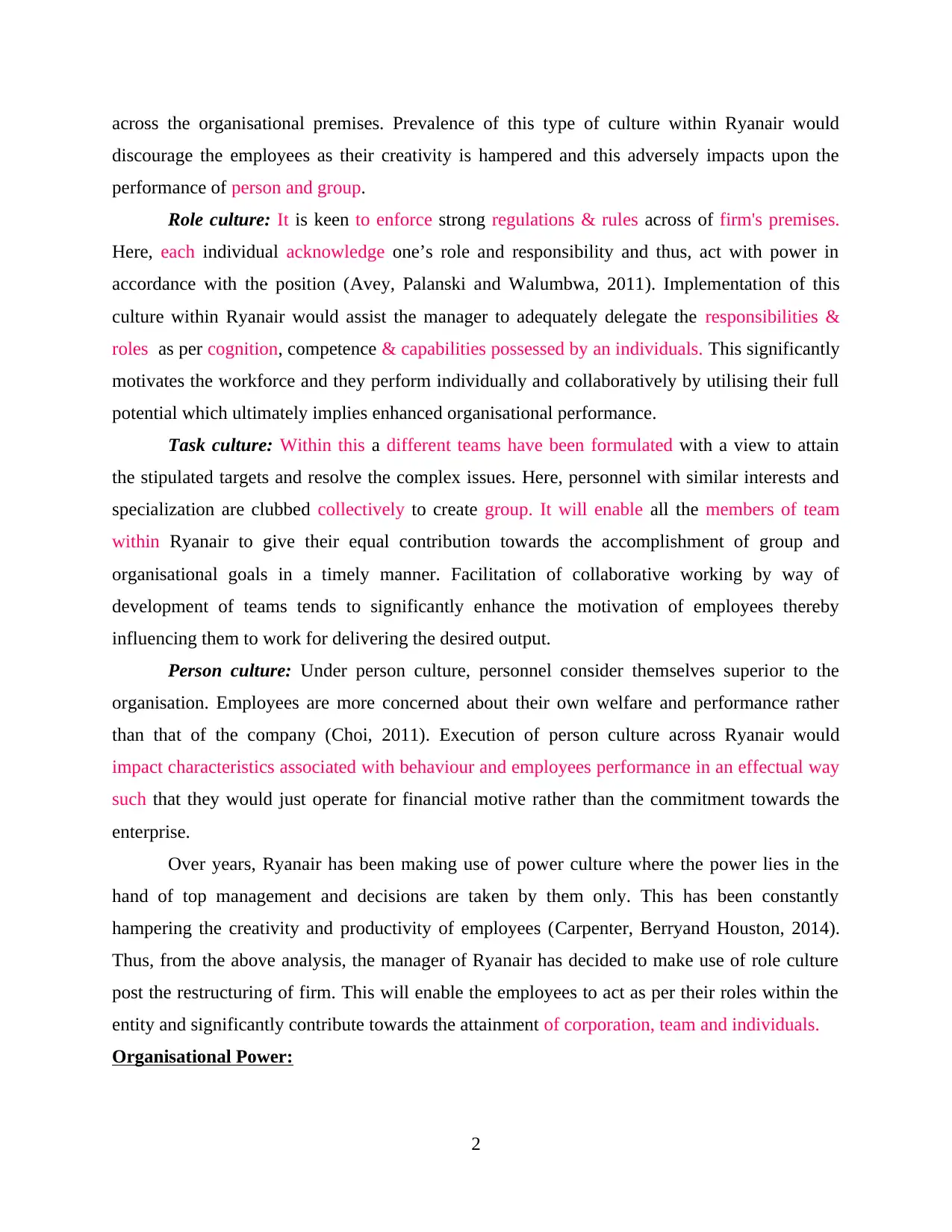
across the organisational premises. Prevalence of this type of culture within Ryanair would
discourage the employees as their creativity is hampered and this adversely impacts upon the
performance of person and group.
Role culture: It is keen to enforce strong regulations & rules across of firm's premises.
Here, each individual acknowledge one’s role and responsibility and thus, act with power in
accordance with the position (Avey, Palanski and Walumbwa, 2011). Implementation of this
culture within Ryanair would assist the manager to adequately delegate the responsibilities &
roles as per cognition, competence & capabilities possessed by an individuals. This significantly
motivates the workforce and they perform individually and collaboratively by utilising their full
potential which ultimately implies enhanced organisational performance.
Task culture: Within this a different teams have been formulated with a view to attain
the stipulated targets and resolve the complex issues. Here, personnel with similar interests and
specialization are clubbed collectively to create group. It will enable all the members of team
within Ryanair to give their equal contribution towards the accomplishment of group and
organisational goals in a timely manner. Facilitation of collaborative working by way of
development of teams tends to significantly enhance the motivation of employees thereby
influencing them to work for delivering the desired output.
Person culture: Under person culture, personnel consider themselves superior to the
organisation. Employees are more concerned about their own welfare and performance rather
than that of the company (Choi, 2011). Execution of person culture across Ryanair would
impact characteristics associated with behaviour and employees performance in an effectual way
such that they would just operate for financial motive rather than the commitment towards the
enterprise.
Over years, Ryanair has been making use of power culture where the power lies in the
hand of top management and decisions are taken by them only. This has been constantly
hampering the creativity and productivity of employees (Carpenter, Berryand Houston, 2014).
Thus, from the above analysis, the manager of Ryanair has decided to make use of role culture
post the restructuring of firm. This will enable the employees to act as per their roles within the
entity and significantly contribute towards the attainment of corporation, team and individuals.
Organisational Power:
2
discourage the employees as their creativity is hampered and this adversely impacts upon the
performance of person and group.
Role culture: It is keen to enforce strong regulations & rules across of firm's premises.
Here, each individual acknowledge one’s role and responsibility and thus, act with power in
accordance with the position (Avey, Palanski and Walumbwa, 2011). Implementation of this
culture within Ryanair would assist the manager to adequately delegate the responsibilities &
roles as per cognition, competence & capabilities possessed by an individuals. This significantly
motivates the workforce and they perform individually and collaboratively by utilising their full
potential which ultimately implies enhanced organisational performance.
Task culture: Within this a different teams have been formulated with a view to attain
the stipulated targets and resolve the complex issues. Here, personnel with similar interests and
specialization are clubbed collectively to create group. It will enable all the members of team
within Ryanair to give their equal contribution towards the accomplishment of group and
organisational goals in a timely manner. Facilitation of collaborative working by way of
development of teams tends to significantly enhance the motivation of employees thereby
influencing them to work for delivering the desired output.
Person culture: Under person culture, personnel consider themselves superior to the
organisation. Employees are more concerned about their own welfare and performance rather
than that of the company (Choi, 2011). Execution of person culture across Ryanair would
impact characteristics associated with behaviour and employees performance in an effectual way
such that they would just operate for financial motive rather than the commitment towards the
enterprise.
Over years, Ryanair has been making use of power culture where the power lies in the
hand of top management and decisions are taken by them only. This has been constantly
hampering the creativity and productivity of employees (Carpenter, Berryand Houston, 2014).
Thus, from the above analysis, the manager of Ryanair has decided to make use of role culture
post the restructuring of firm. This will enable the employees to act as per their roles within the
entity and significantly contribute towards the attainment of corporation, team and individuals.
Organisational Power:
2
Paraphrase This Document
Need a fresh take? Get an instant paraphrase of this document with our AI Paraphraser
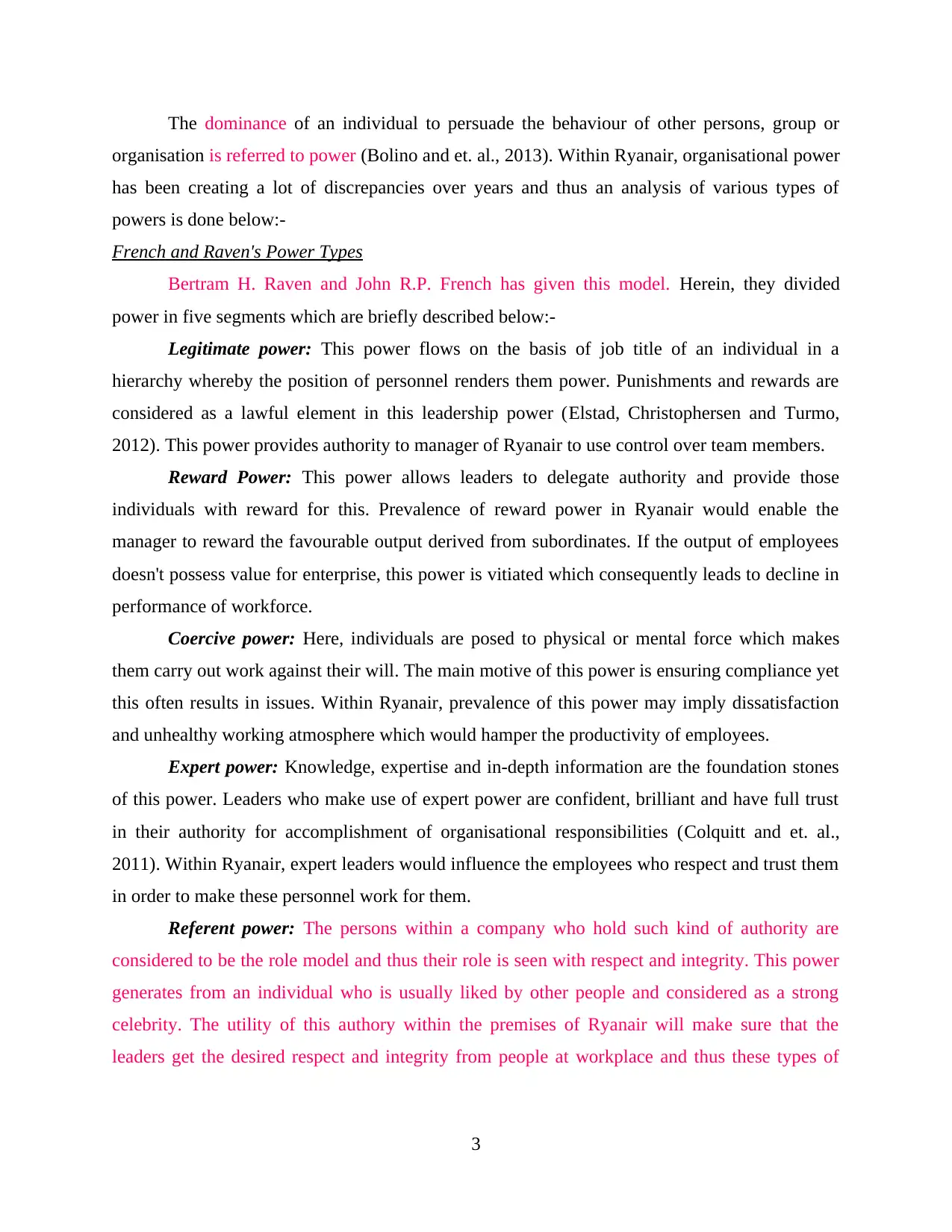
The dominance of an individual to persuade the behaviour of other persons, group or
organisation is referred to power (Bolino and et. al., 2013). Within Ryanair, organisational power
has been creating a lot of discrepancies over years and thus an analysis of various types of
powers is done below:-
French and Raven's Power Types
Bertram H. Raven and John R.P. French has given this model. Herein, they divided
power in five segments which are briefly described below:-
Legitimate power: This power flows on the basis of job title of an individual in a
hierarchy whereby the position of personnel renders them power. Punishments and rewards are
considered as a lawful element in this leadership power (Elstad, Christophersen and Turmo,
2012). This power provides authority to manager of Ryanair to use control over team members.
Reward Power: This power allows leaders to delegate authority and provide those
individuals with reward for this. Prevalence of reward power in Ryanair would enable the
manager to reward the favourable output derived from subordinates. If the output of employees
doesn't possess value for enterprise, this power is vitiated which consequently leads to decline in
performance of workforce.
Coercive power: Here, individuals are posed to physical or mental force which makes
them carry out work against their will. The main motive of this power is ensuring compliance yet
this often results in issues. Within Ryanair, prevalence of this power may imply dissatisfaction
and unhealthy working atmosphere which would hamper the productivity of employees.
Expert power: Knowledge, expertise and in-depth information are the foundation stones
of this power. Leaders who make use of expert power are confident, brilliant and have full trust
in their authority for accomplishment of organisational responsibilities (Colquitt and et. al.,
2011). Within Ryanair, expert leaders would influence the employees who respect and trust them
in order to make these personnel work for them.
Referent power: The persons within a company who hold such kind of authority are
considered to be the role model and thus their role is seen with respect and integrity. This power
generates from an individual who is usually liked by other people and considered as a strong
celebrity. The utility of this authory within the premises of Ryanair will make sure that the
leaders get the desired respect and integrity from people at workplace and thus these types of
3
organisation is referred to power (Bolino and et. al., 2013). Within Ryanair, organisational power
has been creating a lot of discrepancies over years and thus an analysis of various types of
powers is done below:-
French and Raven's Power Types
Bertram H. Raven and John R.P. French has given this model. Herein, they divided
power in five segments which are briefly described below:-
Legitimate power: This power flows on the basis of job title of an individual in a
hierarchy whereby the position of personnel renders them power. Punishments and rewards are
considered as a lawful element in this leadership power (Elstad, Christophersen and Turmo,
2012). This power provides authority to manager of Ryanair to use control over team members.
Reward Power: This power allows leaders to delegate authority and provide those
individuals with reward for this. Prevalence of reward power in Ryanair would enable the
manager to reward the favourable output derived from subordinates. If the output of employees
doesn't possess value for enterprise, this power is vitiated which consequently leads to decline in
performance of workforce.
Coercive power: Here, individuals are posed to physical or mental force which makes
them carry out work against their will. The main motive of this power is ensuring compliance yet
this often results in issues. Within Ryanair, prevalence of this power may imply dissatisfaction
and unhealthy working atmosphere which would hamper the productivity of employees.
Expert power: Knowledge, expertise and in-depth information are the foundation stones
of this power. Leaders who make use of expert power are confident, brilliant and have full trust
in their authority for accomplishment of organisational responsibilities (Colquitt and et. al.,
2011). Within Ryanair, expert leaders would influence the employees who respect and trust them
in order to make these personnel work for them.
Referent power: The persons within a company who hold such kind of authority are
considered to be the role model and thus their role is seen with respect and integrity. This power
generates from an individual who is usually liked by other people and considered as a strong
celebrity. The utility of this authory within the premises of Ryanair will make sure that the
leaders get the desired respect and integrity from people at workplace and thus these types of
3
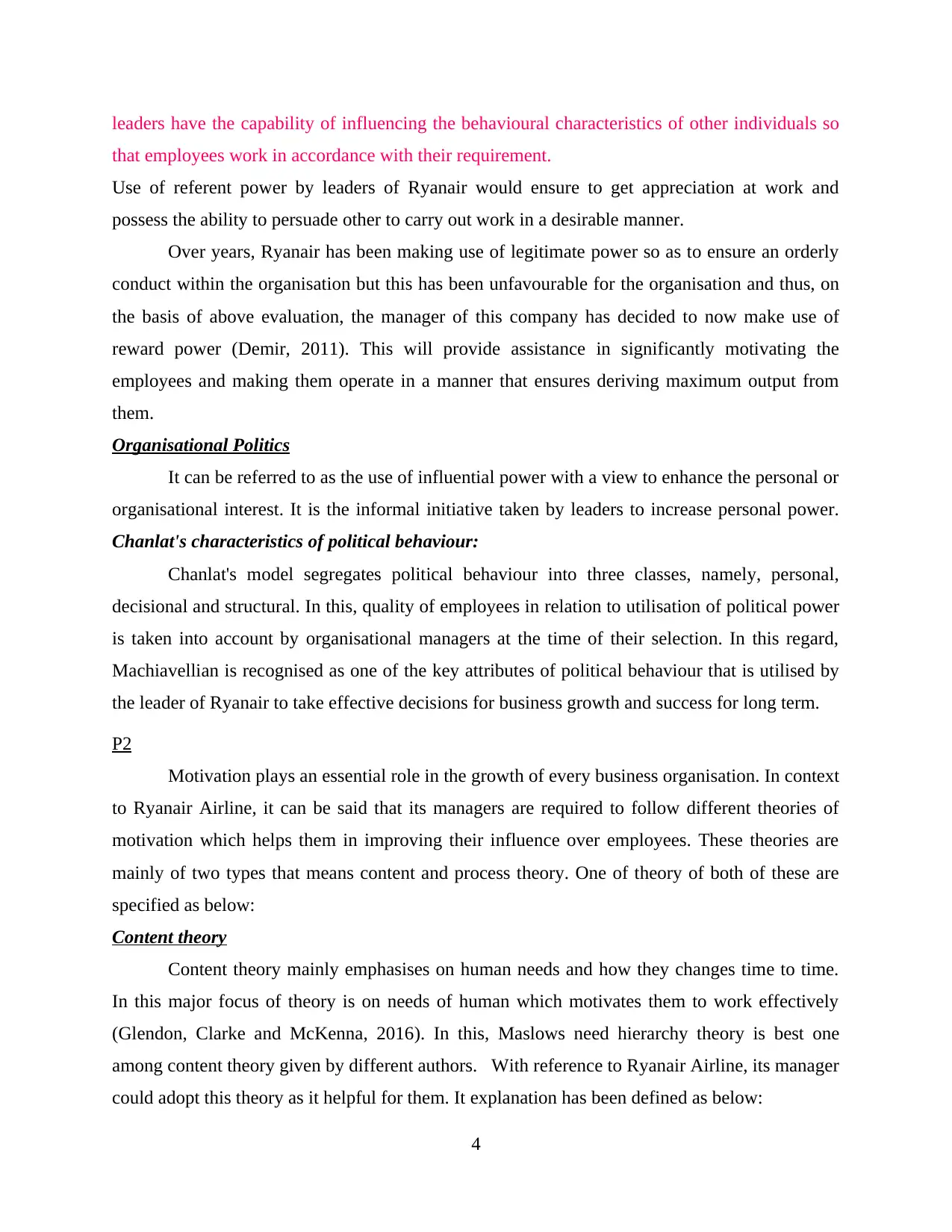
leaders have the capability of influencing the behavioural characteristics of other individuals so
that employees work in accordance with their requirement.
Use of referent power by leaders of Ryanair would ensure to get appreciation at work and
possess the ability to persuade other to carry out work in a desirable manner.
Over years, Ryanair has been making use of legitimate power so as to ensure an orderly
conduct within the organisation but this has been unfavourable for the organisation and thus, on
the basis of above evaluation, the manager of this company has decided to now make use of
reward power (Demir, 2011). This will provide assistance in significantly motivating the
employees and making them operate in a manner that ensures deriving maximum output from
them.
Organisational Politics
It can be referred to as the use of influential power with a view to enhance the personal or
organisational interest. It is the informal initiative taken by leaders to increase personal power.
Chanlat's characteristics of political behaviour:
Chanlat's model segregates political behaviour into three classes, namely, personal,
decisional and structural. In this, quality of employees in relation to utilisation of political power
is taken into account by organisational managers at the time of their selection. In this regard,
Machiavellian is recognised as one of the key attributes of political behaviour that is utilised by
the leader of Ryanair to take effective decisions for business growth and success for long term.
P2
Motivation plays an essential role in the growth of every business organisation. In context
to Ryanair Airline, it can be said that its managers are required to follow different theories of
motivation which helps them in improving their influence over employees. These theories are
mainly of two types that means content and process theory. One of theory of both of these are
specified as below:
Content theory
Content theory mainly emphasises on human needs and how they changes time to time.
In this major focus of theory is on needs of human which motivates them to work effectively
(Glendon, Clarke and McKenna, 2016). In this, Maslows need hierarchy theory is best one
among content theory given by different authors. With reference to Ryanair Airline, its manager
could adopt this theory as it helpful for them. It explanation has been defined as below:
4
that employees work in accordance with their requirement.
Use of referent power by leaders of Ryanair would ensure to get appreciation at work and
possess the ability to persuade other to carry out work in a desirable manner.
Over years, Ryanair has been making use of legitimate power so as to ensure an orderly
conduct within the organisation but this has been unfavourable for the organisation and thus, on
the basis of above evaluation, the manager of this company has decided to now make use of
reward power (Demir, 2011). This will provide assistance in significantly motivating the
employees and making them operate in a manner that ensures deriving maximum output from
them.
Organisational Politics
It can be referred to as the use of influential power with a view to enhance the personal or
organisational interest. It is the informal initiative taken by leaders to increase personal power.
Chanlat's characteristics of political behaviour:
Chanlat's model segregates political behaviour into three classes, namely, personal,
decisional and structural. In this, quality of employees in relation to utilisation of political power
is taken into account by organisational managers at the time of their selection. In this regard,
Machiavellian is recognised as one of the key attributes of political behaviour that is utilised by
the leader of Ryanair to take effective decisions for business growth and success for long term.
P2
Motivation plays an essential role in the growth of every business organisation. In context
to Ryanair Airline, it can be said that its managers are required to follow different theories of
motivation which helps them in improving their influence over employees. These theories are
mainly of two types that means content and process theory. One of theory of both of these are
specified as below:
Content theory
Content theory mainly emphasises on human needs and how they changes time to time.
In this major focus of theory is on needs of human which motivates them to work effectively
(Glendon, Clarke and McKenna, 2016). In this, Maslows need hierarchy theory is best one
among content theory given by different authors. With reference to Ryanair Airline, its manager
could adopt this theory as it helpful for them. It explanation has been defined as below:
4
⊘ This is a preview!⊘
Do you want full access?
Subscribe today to unlock all pages.

Trusted by 1+ million students worldwide
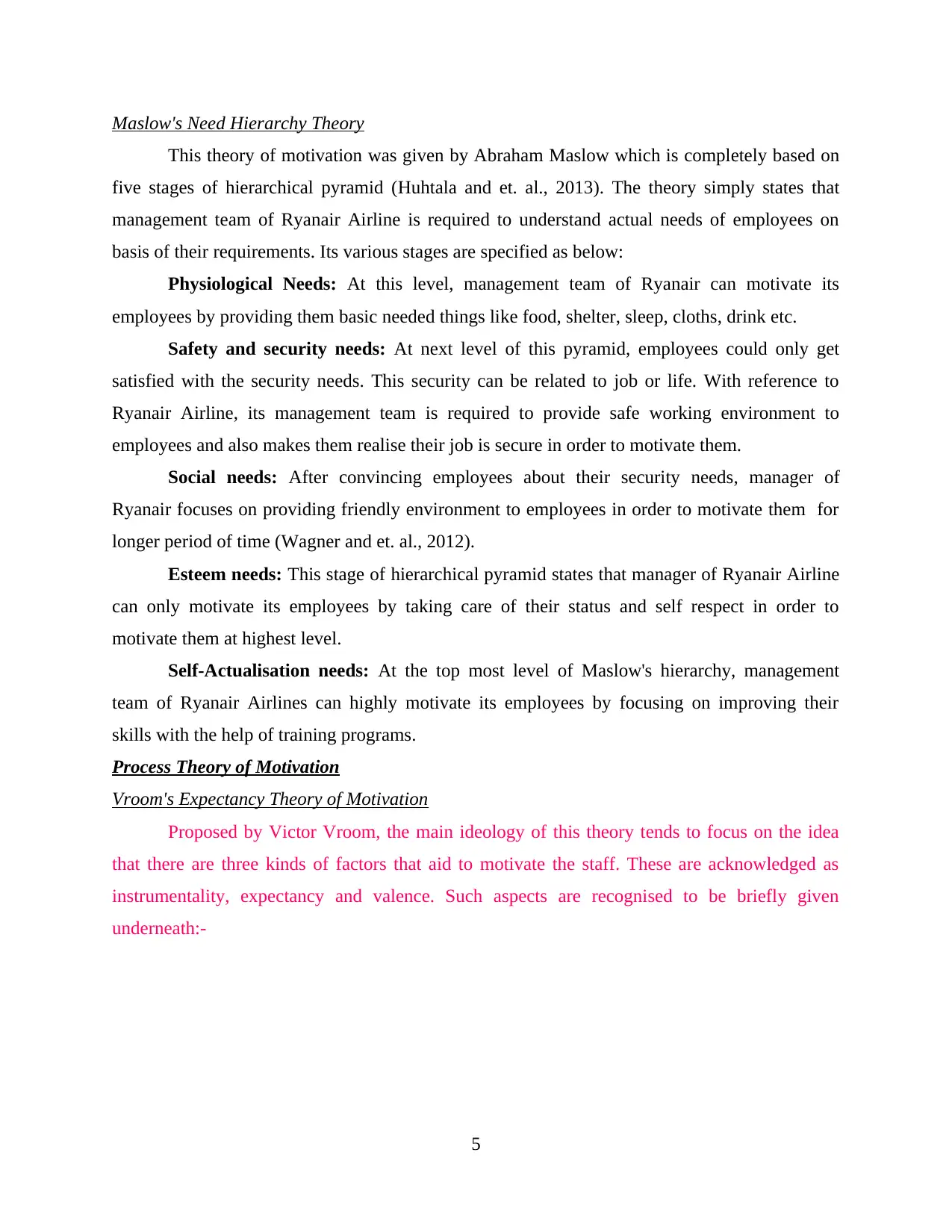
Maslow's Need Hierarchy Theory
This theory of motivation was given by Abraham Maslow which is completely based on
five stages of hierarchical pyramid (Huhtala and et. al., 2013). The theory simply states that
management team of Ryanair Airline is required to understand actual needs of employees on
basis of their requirements. Its various stages are specified as below:
Physiological Needs: At this level, management team of Ryanair can motivate its
employees by providing them basic needed things like food, shelter, sleep, cloths, drink etc.
Safety and security needs: At next level of this pyramid, employees could only get
satisfied with the security needs. This security can be related to job or life. With reference to
Ryanair Airline, its management team is required to provide safe working environment to
employees and also makes them realise their job is secure in order to motivate them.
Social needs: After convincing employees about their security needs, manager of
Ryanair focuses on providing friendly environment to employees in order to motivate them for
longer period of time (Wagner and et. al., 2012).
Esteem needs: This stage of hierarchical pyramid states that manager of Ryanair Airline
can only motivate its employees by taking care of their status and self respect in order to
motivate them at highest level.
Self-Actualisation needs: At the top most level of Maslow's hierarchy, management
team of Ryanair Airlines can highly motivate its employees by focusing on improving their
skills with the help of training programs.
Process Theory of Motivation
Vroom's Expectancy Theory of Motivation
Proposed by Victor Vroom, the main ideology of this theory tends to focus on the idea
that there are three kinds of factors that aid to motivate the staff. These are acknowledged as
instrumentality, expectancy and valence. Such aspects are recognised to be briefly given
underneath:-
5
This theory of motivation was given by Abraham Maslow which is completely based on
five stages of hierarchical pyramid (Huhtala and et. al., 2013). The theory simply states that
management team of Ryanair Airline is required to understand actual needs of employees on
basis of their requirements. Its various stages are specified as below:
Physiological Needs: At this level, management team of Ryanair can motivate its
employees by providing them basic needed things like food, shelter, sleep, cloths, drink etc.
Safety and security needs: At next level of this pyramid, employees could only get
satisfied with the security needs. This security can be related to job or life. With reference to
Ryanair Airline, its management team is required to provide safe working environment to
employees and also makes them realise their job is secure in order to motivate them.
Social needs: After convincing employees about their security needs, manager of
Ryanair focuses on providing friendly environment to employees in order to motivate them for
longer period of time (Wagner and et. al., 2012).
Esteem needs: This stage of hierarchical pyramid states that manager of Ryanair Airline
can only motivate its employees by taking care of their status and self respect in order to
motivate them at highest level.
Self-Actualisation needs: At the top most level of Maslow's hierarchy, management
team of Ryanair Airlines can highly motivate its employees by focusing on improving their
skills with the help of training programs.
Process Theory of Motivation
Vroom's Expectancy Theory of Motivation
Proposed by Victor Vroom, the main ideology of this theory tends to focus on the idea
that there are three kinds of factors that aid to motivate the staff. These are acknowledged as
instrumentality, expectancy and valence. Such aspects are recognised to be briefly given
underneath:-
5
Paraphrase This Document
Need a fresh take? Get an instant paraphrase of this document with our AI Paraphraser
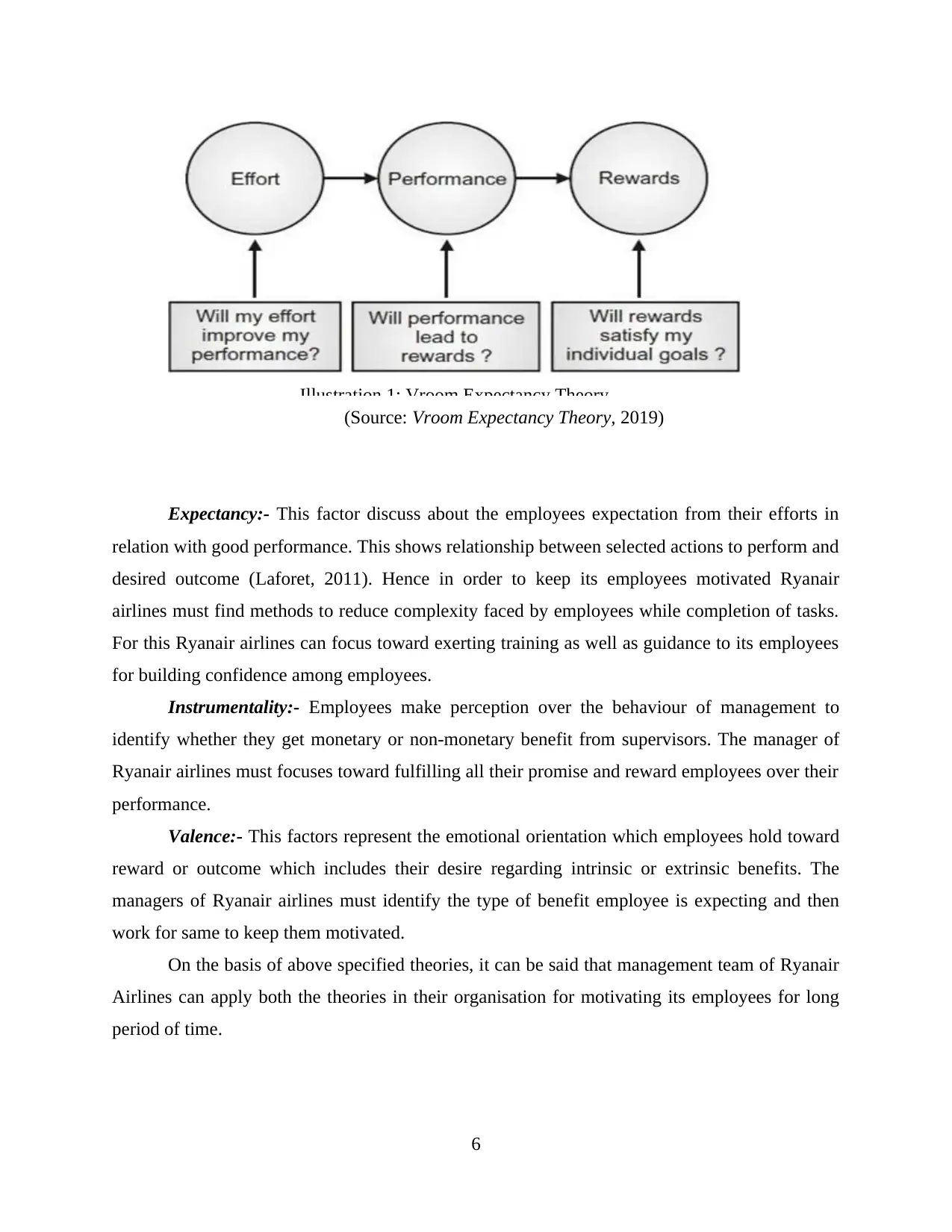
Illustration 1: Vroom Expectancy Theory
(Source: Vroom Expectancy Theory, 2019)
Expectancy:- This factor discuss about the employees expectation from their efforts in
relation with good performance. This shows relationship between selected actions to perform and
desired outcome (Laforet, 2011). Hence in order to keep its employees motivated Ryanair
airlines must find methods to reduce complexity faced by employees while completion of tasks.
For this Ryanair airlines can focus toward exerting training as well as guidance to its employees
for building confidence among employees.
Instrumentality:- Employees make perception over the behaviour of management to
identify whether they get monetary or non-monetary benefit from supervisors. The manager of
Ryanair airlines must focuses toward fulfilling all their promise and reward employees over their
performance.
Valence:- This factors represent the emotional orientation which employees hold toward
reward or outcome which includes their desire regarding intrinsic or extrinsic benefits. The
managers of Ryanair airlines must identify the type of benefit employee is expecting and then
work for same to keep them motivated.
On the basis of above specified theories, it can be said that management team of Ryanair
Airlines can apply both the theories in their organisation for motivating its employees for long
period of time.
6
(Source: Vroom Expectancy Theory, 2019)
Expectancy:- This factor discuss about the employees expectation from their efforts in
relation with good performance. This shows relationship between selected actions to perform and
desired outcome (Laforet, 2011). Hence in order to keep its employees motivated Ryanair
airlines must find methods to reduce complexity faced by employees while completion of tasks.
For this Ryanair airlines can focus toward exerting training as well as guidance to its employees
for building confidence among employees.
Instrumentality:- Employees make perception over the behaviour of management to
identify whether they get monetary or non-monetary benefit from supervisors. The manager of
Ryanair airlines must focuses toward fulfilling all their promise and reward employees over their
performance.
Valence:- This factors represent the emotional orientation which employees hold toward
reward or outcome which includes their desire regarding intrinsic or extrinsic benefits. The
managers of Ryanair airlines must identify the type of benefit employee is expecting and then
work for same to keep them motivated.
On the basis of above specified theories, it can be said that management team of Ryanair
Airlines can apply both the theories in their organisation for motivating its employees for long
period of time.
6
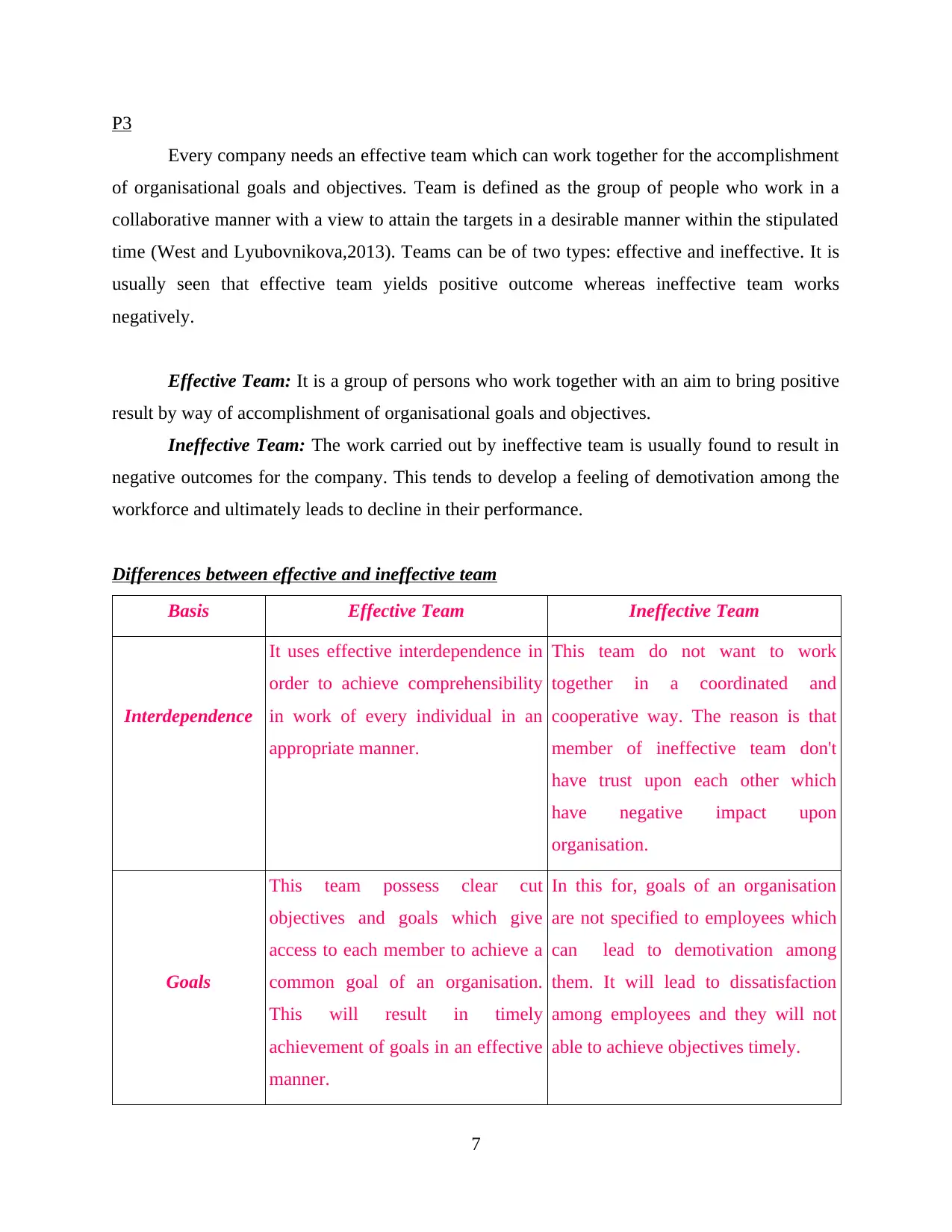
P3
Every company needs an effective team which can work together for the accomplishment
of organisational goals and objectives. Team is defined as the group of people who work in a
collaborative manner with a view to attain the targets in a desirable manner within the stipulated
time (West and Lyubovnikova,2013). Teams can be of two types: effective and ineffective. It is
usually seen that effective team yields positive outcome whereas ineffective team works
negatively.
Effective Team: It is a group of persons who work together with an aim to bring positive
result by way of accomplishment of organisational goals and objectives.
Ineffective Team: The work carried out by ineffective team is usually found to result in
negative outcomes for the company. This tends to develop a feeling of demotivation among the
workforce and ultimately leads to decline in their performance.
Differences between effective and ineffective team
Basis Effective Team Ineffective Team
Interdependence
It uses effective interdependence in
order to achieve comprehensibility
in work of every individual in an
appropriate manner.
This team do not want to work
together in a coordinated and
cooperative way. The reason is that
member of ineffective team don't
have trust upon each other which
have negative impact upon
organisation.
Goals
This team possess clear cut
objectives and goals which give
access to each member to achieve a
common goal of an organisation.
This will result in timely
achievement of goals in an effective
manner.
In this for, goals of an organisation
are not specified to employees which
can lead to demotivation among
them. It will lead to dissatisfaction
among employees and they will not
able to achieve objectives timely.
7
Every company needs an effective team which can work together for the accomplishment
of organisational goals and objectives. Team is defined as the group of people who work in a
collaborative manner with a view to attain the targets in a desirable manner within the stipulated
time (West and Lyubovnikova,2013). Teams can be of two types: effective and ineffective. It is
usually seen that effective team yields positive outcome whereas ineffective team works
negatively.
Effective Team: It is a group of persons who work together with an aim to bring positive
result by way of accomplishment of organisational goals and objectives.
Ineffective Team: The work carried out by ineffective team is usually found to result in
negative outcomes for the company. This tends to develop a feeling of demotivation among the
workforce and ultimately leads to decline in their performance.
Differences between effective and ineffective team
Basis Effective Team Ineffective Team
Interdependence
It uses effective interdependence in
order to achieve comprehensibility
in work of every individual in an
appropriate manner.
This team do not want to work
together in a coordinated and
cooperative way. The reason is that
member of ineffective team don't
have trust upon each other which
have negative impact upon
organisation.
Goals
This team possess clear cut
objectives and goals which give
access to each member to achieve a
common goal of an organisation.
This will result in timely
achievement of goals in an effective
manner.
In this for, goals of an organisation
are not specified to employees which
can lead to demotivation among
them. It will lead to dissatisfaction
among employees and they will not
able to achieve objectives timely.
7
⊘ This is a preview!⊘
Do you want full access?
Subscribe today to unlock all pages.

Trusted by 1+ million students worldwide
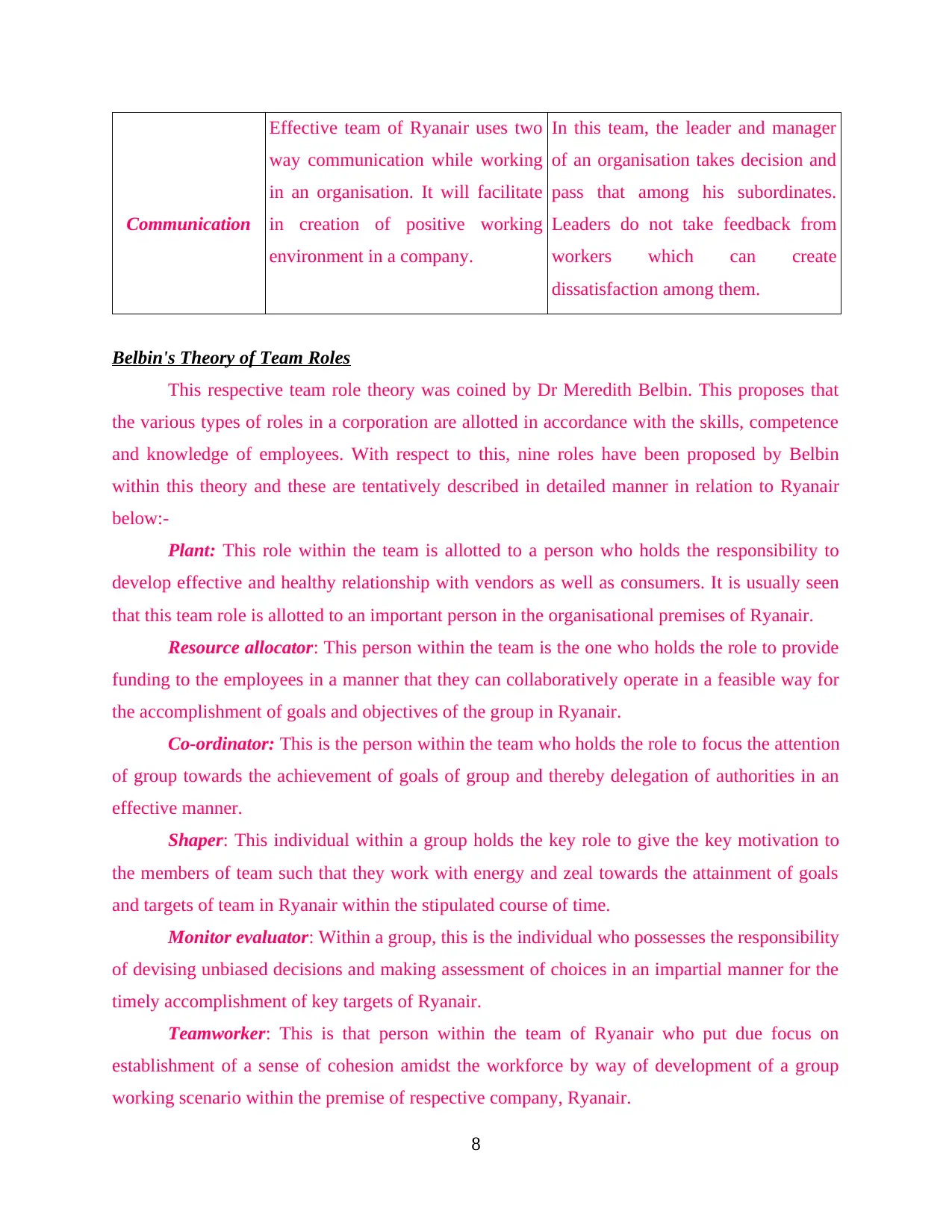
Communication
Effective team of Ryanair uses two
way communication while working
in an organisation. It will facilitate
in creation of positive working
environment in a company.
In this team, the leader and manager
of an organisation takes decision and
pass that among his subordinates.
Leaders do not take feedback from
workers which can create
dissatisfaction among them.
Belbin's Theory of Team Roles
This respective team role theory was coined by Dr Meredith Belbin. This proposes that
the various types of roles in a corporation are allotted in accordance with the skills, competence
and knowledge of employees. With respect to this, nine roles have been proposed by Belbin
within this theory and these are tentatively described in detailed manner in relation to Ryanair
below:-
Plant: This role within the team is allotted to a person who holds the responsibility to
develop effective and healthy relationship with vendors as well as consumers. It is usually seen
that this team role is allotted to an important person in the organisational premises of Ryanair.
Resource allocator: This person within the team is the one who holds the role to provide
funding to the employees in a manner that they can collaboratively operate in a feasible way for
the accomplishment of goals and objectives of the group in Ryanair.
Co-ordinator: This is the person within the team who holds the role to focus the attention
of group towards the achievement of goals of group and thereby delegation of authorities in an
effective manner.
Shaper: This individual within a group holds the key role to give the key motivation to
the members of team such that they work with energy and zeal towards the attainment of goals
and targets of team in Ryanair within the stipulated course of time.
Monitor evaluator: Within a group, this is the individual who possesses the responsibility
of devising unbiased decisions and making assessment of choices in an impartial manner for the
timely accomplishment of key targets of Ryanair.
Teamworker: This is that person within the team of Ryanair who put due focus on
establishment of a sense of cohesion amidst the workforce by way of development of a group
working scenario within the premise of respective company, Ryanair.
8
Effective team of Ryanair uses two
way communication while working
in an organisation. It will facilitate
in creation of positive working
environment in a company.
In this team, the leader and manager
of an organisation takes decision and
pass that among his subordinates.
Leaders do not take feedback from
workers which can create
dissatisfaction among them.
Belbin's Theory of Team Roles
This respective team role theory was coined by Dr Meredith Belbin. This proposes that
the various types of roles in a corporation are allotted in accordance with the skills, competence
and knowledge of employees. With respect to this, nine roles have been proposed by Belbin
within this theory and these are tentatively described in detailed manner in relation to Ryanair
below:-
Plant: This role within the team is allotted to a person who holds the responsibility to
develop effective and healthy relationship with vendors as well as consumers. It is usually seen
that this team role is allotted to an important person in the organisational premises of Ryanair.
Resource allocator: This person within the team is the one who holds the role to provide
funding to the employees in a manner that they can collaboratively operate in a feasible way for
the accomplishment of goals and objectives of the group in Ryanair.
Co-ordinator: This is the person within the team who holds the role to focus the attention
of group towards the achievement of goals of group and thereby delegation of authorities in an
effective manner.
Shaper: This individual within a group holds the key role to give the key motivation to
the members of team such that they work with energy and zeal towards the attainment of goals
and targets of team in Ryanair within the stipulated course of time.
Monitor evaluator: Within a group, this is the individual who possesses the responsibility
of devising unbiased decisions and making assessment of choices in an impartial manner for the
timely accomplishment of key targets of Ryanair.
Teamworker: This is that person within the team of Ryanair who put due focus on
establishment of a sense of cohesion amidst the workforce by way of development of a group
working scenario within the premise of respective company, Ryanair.
8
Paraphrase This Document
Need a fresh take? Get an instant paraphrase of this document with our AI Paraphraser
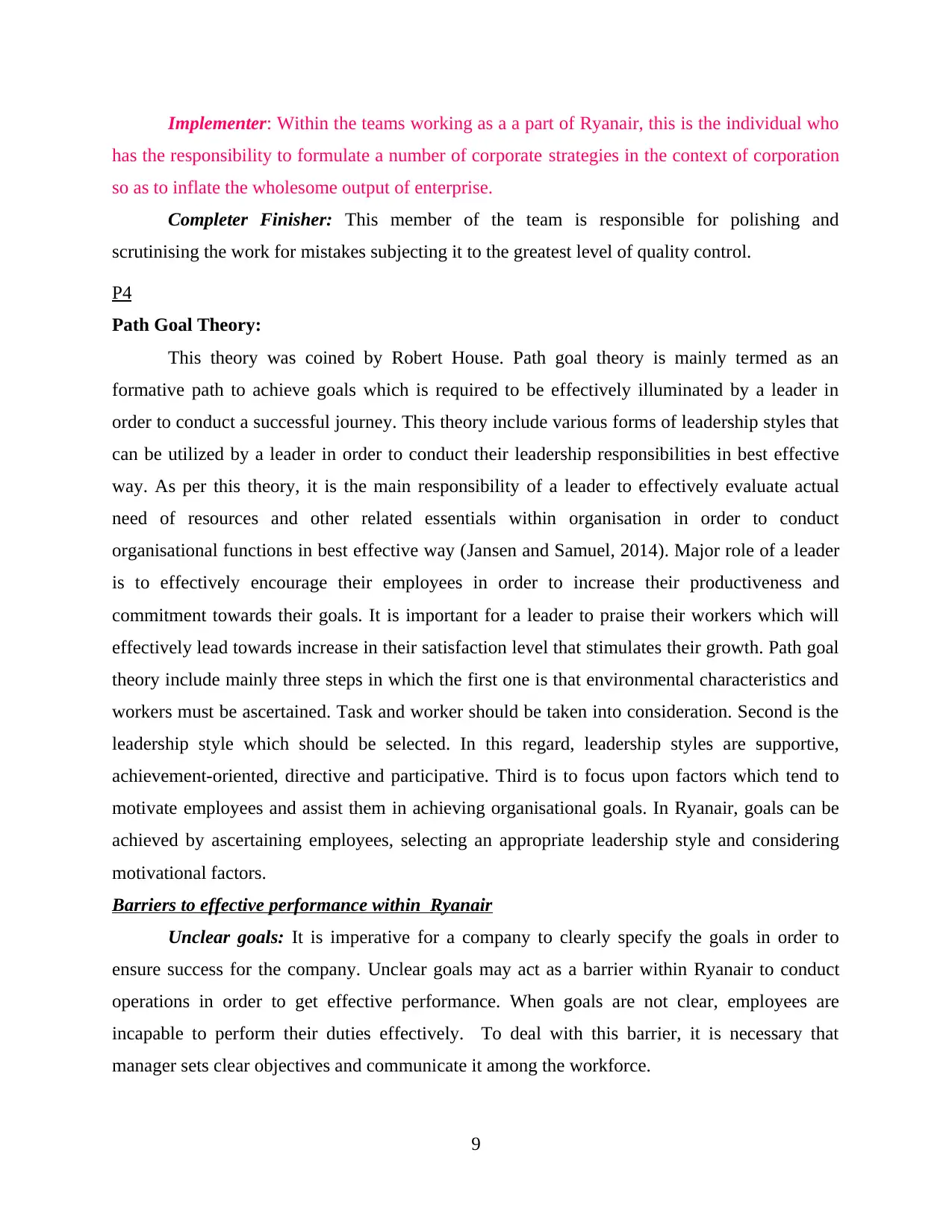
Implementer: Within the teams working as a a part of Ryanair, this is the individual who
has the responsibility to formulate a number of corporate strategies in the context of corporation
so as to inflate the wholesome output of enterprise.
Completer Finisher: This member of the team is responsible for polishing and
scrutinising the work for mistakes subjecting it to the greatest level of quality control.
P4
Path Goal Theory:
This theory was coined by Robert House. Path goal theory is mainly termed as an
formative path to achieve goals which is required to be effectively illuminated by a leader in
order to conduct a successful journey. This theory include various forms of leadership styles that
can be utilized by a leader in order to conduct their leadership responsibilities in best effective
way. As per this theory, it is the main responsibility of a leader to effectively evaluate actual
need of resources and other related essentials within organisation in order to conduct
organisational functions in best effective way (Jansen and Samuel, 2014). Major role of a leader
is to effectively encourage their employees in order to increase their productiveness and
commitment towards their goals. It is important for a leader to praise their workers which will
effectively lead towards increase in their satisfaction level that stimulates their growth. Path goal
theory include mainly three steps in which the first one is that environmental characteristics and
workers must be ascertained. Task and worker should be taken into consideration. Second is the
leadership style which should be selected. In this regard, leadership styles are supportive,
achievement-oriented, directive and participative. Third is to focus upon factors which tend to
motivate employees and assist them in achieving organisational goals. In Ryanair, goals can be
achieved by ascertaining employees, selecting an appropriate leadership style and considering
motivational factors.
Barriers to effective performance within Ryanair
Unclear goals: It is imperative for a company to clearly specify the goals in order to
ensure success for the company. Unclear goals may act as a barrier within Ryanair to conduct
operations in order to get effective performance. When goals are not clear, employees are
incapable to perform their duties effectively. To deal with this barrier, it is necessary that
manager sets clear objectives and communicate it among the workforce.
9
has the responsibility to formulate a number of corporate strategies in the context of corporation
so as to inflate the wholesome output of enterprise.
Completer Finisher: This member of the team is responsible for polishing and
scrutinising the work for mistakes subjecting it to the greatest level of quality control.
P4
Path Goal Theory:
This theory was coined by Robert House. Path goal theory is mainly termed as an
formative path to achieve goals which is required to be effectively illuminated by a leader in
order to conduct a successful journey. This theory include various forms of leadership styles that
can be utilized by a leader in order to conduct their leadership responsibilities in best effective
way. As per this theory, it is the main responsibility of a leader to effectively evaluate actual
need of resources and other related essentials within organisation in order to conduct
organisational functions in best effective way (Jansen and Samuel, 2014). Major role of a leader
is to effectively encourage their employees in order to increase their productiveness and
commitment towards their goals. It is important for a leader to praise their workers which will
effectively lead towards increase in their satisfaction level that stimulates their growth. Path goal
theory include mainly three steps in which the first one is that environmental characteristics and
workers must be ascertained. Task and worker should be taken into consideration. Second is the
leadership style which should be selected. In this regard, leadership styles are supportive,
achievement-oriented, directive and participative. Third is to focus upon factors which tend to
motivate employees and assist them in achieving organisational goals. In Ryanair, goals can be
achieved by ascertaining employees, selecting an appropriate leadership style and considering
motivational factors.
Barriers to effective performance within Ryanair
Unclear goals: It is imperative for a company to clearly specify the goals in order to
ensure success for the company. Unclear goals may act as a barrier within Ryanair to conduct
operations in order to get effective performance. When goals are not clear, employees are
incapable to perform their duties effectively. To deal with this barrier, it is necessary that
manager sets clear objectives and communicate it among the workforce.
9
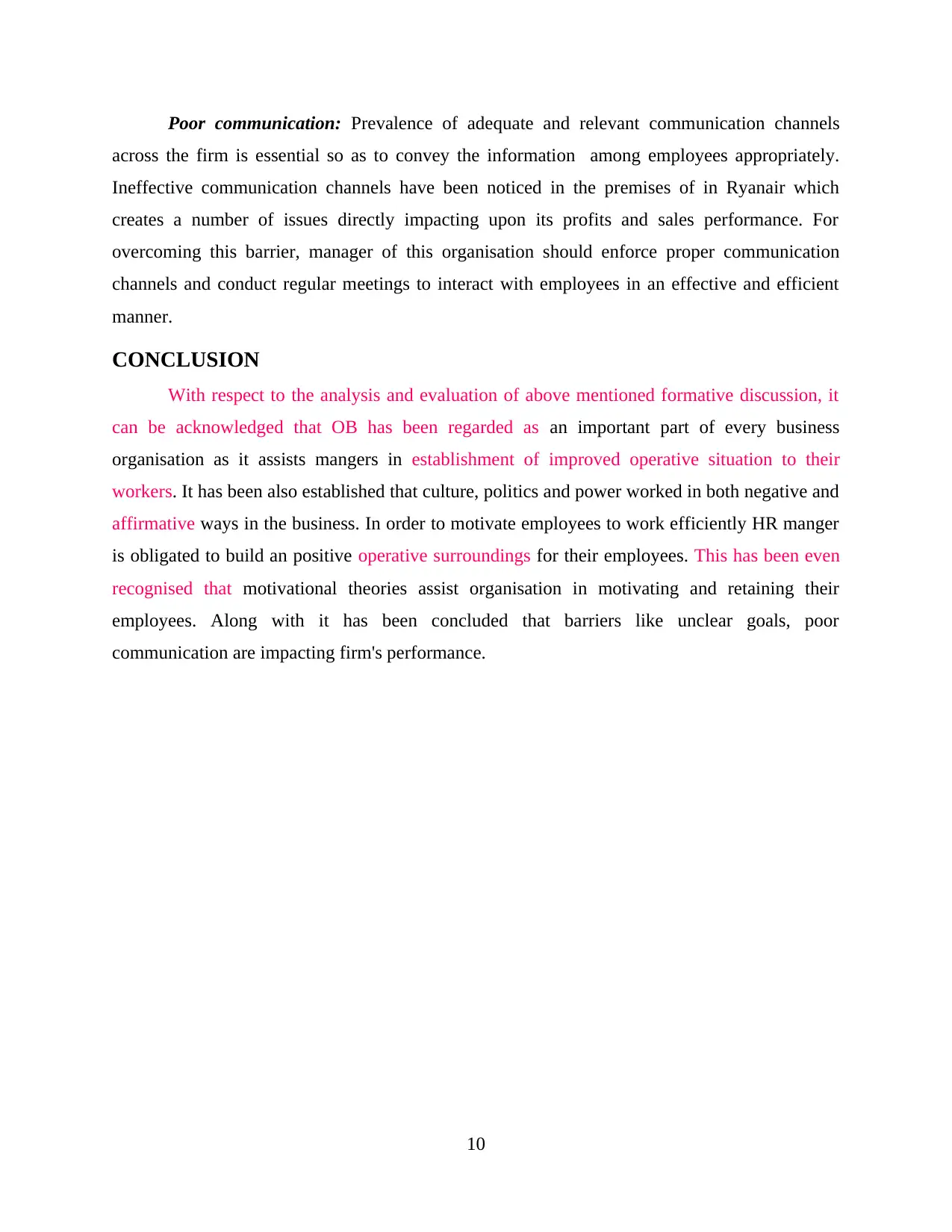
Poor communication: Prevalence of adequate and relevant communication channels
across the firm is essential so as to convey the information among employees appropriately.
Ineffective communication channels have been noticed in the premises of in Ryanair which
creates a number of issues directly impacting upon its profits and sales performance. For
overcoming this barrier, manager of this organisation should enforce proper communication
channels and conduct regular meetings to interact with employees in an effective and efficient
manner.
CONCLUSION
With respect to the analysis and evaluation of above mentioned formative discussion, it
can be acknowledged that OB has been regarded as an important part of every business
organisation as it assists mangers in establishment of improved operative situation to their
workers. It has been also established that culture, politics and power worked in both negative and
affirmative ways in the business. In order to motivate employees to work efficiently HR manger
is obligated to build an positive operative surroundings for their employees. This has been even
recognised that motivational theories assist organisation in motivating and retaining their
employees. Along with it has been concluded that barriers like unclear goals, poor
communication are impacting firm's performance.
10
across the firm is essential so as to convey the information among employees appropriately.
Ineffective communication channels have been noticed in the premises of in Ryanair which
creates a number of issues directly impacting upon its profits and sales performance. For
overcoming this barrier, manager of this organisation should enforce proper communication
channels and conduct regular meetings to interact with employees in an effective and efficient
manner.
CONCLUSION
With respect to the analysis and evaluation of above mentioned formative discussion, it
can be acknowledged that OB has been regarded as an important part of every business
organisation as it assists mangers in establishment of improved operative situation to their
workers. It has been also established that culture, politics and power worked in both negative and
affirmative ways in the business. In order to motivate employees to work efficiently HR manger
is obligated to build an positive operative surroundings for their employees. This has been even
recognised that motivational theories assist organisation in motivating and retaining their
employees. Along with it has been concluded that barriers like unclear goals, poor
communication are impacting firm's performance.
10
⊘ This is a preview!⊘
Do you want full access?
Subscribe today to unlock all pages.

Trusted by 1+ million students worldwide
1 out of 13
Related Documents
Your All-in-One AI-Powered Toolkit for Academic Success.
+13062052269
info@desklib.com
Available 24*7 on WhatsApp / Email
![[object Object]](/_next/static/media/star-bottom.7253800d.svg)
Unlock your academic potential
Copyright © 2020–2026 A2Z Services. All Rights Reserved. Developed and managed by ZUCOL.





